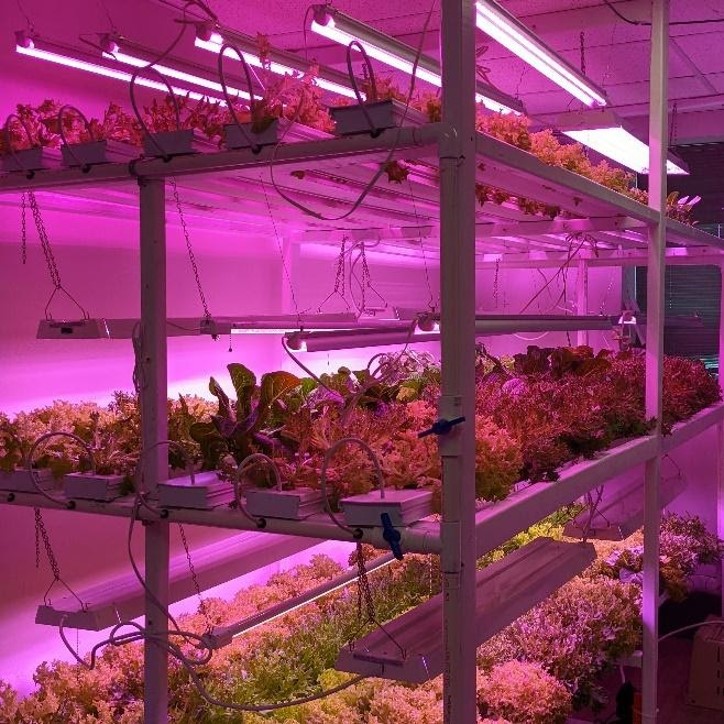Globally, agriculture accounts for nearly a quarter of greenhouse gas emissions, uses nearly two-thirds of freshwater, and in many countries is also the biggest contributor to water pollution. Vertical and indoor farming is one solution that can fix these problems by reducing carbon footprint and resource usage. The one catch is if these farms want to produce organic produce, some of the inputs used are not organic. This is where Re-Nuble comes in, producing inputs for vertical and indoor farms that are organic-enabling. Tinia Pina digs into this issue and how Re-Nuble is filling in this gap.
What problem are you trying to solve and why are you trying to solve this?
Re-Nuble is focusing on the input market for agriculture, specifically for soilless or indoor agriculture. When it comes to nutrients, products for soilless farms are fundamentally different than those for traditional farming.
It is hard to for farms to go organic by using alternatives to mineral salts. The problem at hand is that for soilless farms to go organic, using any normal organic inputs can cause food safety concerns, or they can clog the system, as microbes latch to any source oxygen, which can lead to root rot. Additionally, products for soilless farms today lack consistency. Re-Nuble’s products give farmers the reliability to use Re-Nuble’s product as an alternative to mineral salt.
Why are you solving this problem?
When I was a former SAT teacher through a volunteer program in New York City, the kids I was teaching from 8am – 3 pm on Saturday were bringing processed, not nutrient-dense food. As a result, right after lunch, attention levels would drop. With these diets (lack to nutrition), these kids would have a long-term disadvantage. If Re-Nuble can be a way to enable more farms to grow organic so that more people can have access through an increase supply, then we can bring down the price point so that it is more accessible.
How are you thinking about impact?
As mineral salts for agriculture currently contribute to three percent of the global greenhouse gas emissions, we are focusing on the impact from reducing carbon emissions from the agriculture supply chain. Most mineral salts are mined and manufactured in locations as distant as Russia, China, and Brazil. On top of that, manufacturing is fossil fuel intensive.
Re-Nuble is reducing emissions by providing a sustainable source of mineral salts, and by diverting food waste from landfill. We are currently able to divert 500,000 tons of food waste from landfill per year per facility. By using Away We Grow, a one acre farm eliminates 1.62 metric tons of CO2 (equivalent) from the atmosphere and removes 18.75 pounds of CO2e that would otherwise have been released from food waste sent to landfills
As we scale and grow, scaling facilities and licensing our technologies locally for agricultural economies allows us to reduce food waste. This creates jobs and provides food security for communities.
The other piece of impact we have noticed is that plants using our mineral salts are showing resistance to stress (high heat, limited water, etc.). If stress on plants is not managed (by cooling and controlling humidity) can impact the harvest. If our product allows crops to grow at higher temperatures, that means farms can see energy savings due to lower cooling costs. This is huge considering that 70-80% of a farms’ expenses go towards on just cooling.
The last part, which ties into why I started Re-Nuble in the first place, is that farms will be able to go organic by using Re-Nuble’s products. With an increase in organic supply, I’m hoping to see a 10-15% increase in domestic organic produce supply here in the U.S..
How does Re-Nuble fit into the market today?
The main value point that resonates with our customers is how can we help them increase their marketability and sustainability given that there have been more new farms trying to grow in controlled environments. It has become hypercompetitive. Farms are trying to: 1) build a brand that shows they’re growing nutritionally robust foods, 2) have environmental stewardship, 3) reduce their carbon emissions, and 4) growing organic food. We have positioned Re-Nuble to deliver on all four of those pieces, while being cost competitive to the industry substitute.
Another factor to consider here is policy. Here in the US, a minority of farms can grow certified organic foods using mineral salts but this is heavily dependent on their organic certifier. However, in Europe and elsewhere, produce is not certified as organic if farms use mineral salts or soilless grow media (an alternative to soil). Our platform of products allows for more universal organic certification or certifiability.
Outlook
Certified organic food and enabling overall sustainable, closed loop operations for these farms is the mission for Re-Nuble. One thing that was mentioned in the discussion with was that there were previously protests to prevent the USDA from letting hydroponic and soilless farms from producing certified organic food. Fortunately, the USDA has allowed for hydroponic and soilless farms to be able to grow organic certified produce.
The protests were coming from the perspective of competing for market share. In a way hydroponic and soilless farms offer traditional farms a complimentary production space, especially when considering different harvest seasons and the impact of climate change on harvests. If traditional farms add a hydroponic or soilless farm to their land, it adds diversity to the crops and revenue streams.
The fact that traditional food manufacturers, vertically integrated, large soil farms and retailers are diversifying is proof that we will start to see more indoor farms expand and new entrants enter this hypercompetitive grower landscape.
About The Author

Daniel currently works at Lawrence Livermore National Laboratory. His original assignment was to maintain and update facility safety documentation for all facilities on-site, and perform risk analysis. Over time, his role has expanded to leading continuous improvement efforts through product management.
Concurrently, Daniel volunteers with Techstars, helping organize startup weekends, and with the American Institute of Chemical Engineers, organizing events on the local and national levels of the organization. He also volunteers with One World, and previously with Powerhouse Ventures, to source and screen startups for potential investment.
Daniel holds a BS in Chemical Engineering from UC Davis, and recently completed coursework in energy innovation from Stanford. His passion is at the intersection of sustainability, innovation, and business.

